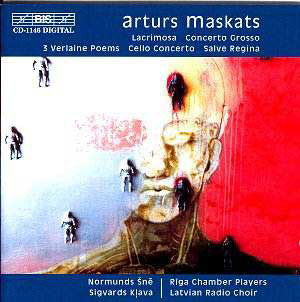Arturs Maskats studied at the Latvian Academy of Music,
graduating in 1982 when he was twenty-five. He spent the following sixteen
years as music director of the Daile theatre, composing music for over
ninety theatrical productions throughout his native country. He is now
artistic director of the Latvian National Opera and harbours two dreams
– to write a series of symphonies ("Symphonies are an impractical
genre but one should write at least four") and to investigate the
tango. I welcome the former heartily but hope he can be dissuaded from
the latter – the world is already suffering a pandemic of Piazzolla
inspired tangos.
If Vasks is Latvia’s most internationally known composer
Maskats is clearly imbued with something of the same inwardness of feeling
and the technical means by which to convey it. On this BIS disc, intelligent
programming and production as ever from this company, choral works begin
and close with a centerpiece vocal ensemble work around which sit two
big orchestral pieces. Lacrimosa was premiered on the first anniversary
of the sinking of the ferry Estonia, with eight hundred lives
lost. Opening with the choir almost inaudible it gains in amplitude
throughout its seven-minute length, ostinato violins and an increasingly
strident and interjectory organ adding their own discerning moments.
This leads to a clash of tonalities in the choir, produced by the increasingly
fractious and turbulent writing, before a reconciled peace slowly develops
– a memorial piece of depth and one that abjures simplicities. The five
movement, classically based Concerto grosso of 1996 opens with the obscure
plink of the percussion and then with Pärt like stasis but soon
violin, percussion and then cello become heated before a return to the
initial percussion notes and a musing violin. Lest this should conjure
up images of Holy Minimalism the composer I’m most reminded of in the
strong second movement allegro is none other than Brahms. There is a
strongly string based affinity with the Double Concerto in this Concerto
grosso and one that co-exists with moments of neo-classicism. A spectral
percussion (vibraharp?) haunts the slow movement over ominous pizzicati
– some beautiful string writing and playing here - whilst the fourth
movement allegro is one of the most convincing of all. There is a strong
sense of romantic dialogue here and a growing ferment over increasingly
acerbic orchestral background support – in the foreground the cello
holds onto a slithery harmony and the percussion whip cracks the movement
onwards. The cadenza here is an energetic and taxing late romantic,
Brahmsian affair. The last movement – an adagio – returns cyclically
to the material of the opening one, ending the piece with a musing somewhat
enigmatic profile. Don’t expect Tippett’s Corelli Variations. This is
a work that takes the bones of classical structure and clothes them
with a greater weight of romantic sensibility than is perhaps wise but
as Maskats himself says "do not be afraid of these things."
The Cello Concerto was premiered in France in 1992,
the year of its composition, and was inspired by the daughter of the
Latvian composer Jekabs Medinš. It’s elegiac in feeling, lasting seventeen
minutes, the five movements running seamlessly together. Maskats has
used elements or motifs from two of Medinš’s own cello concertos and
woven them into the syntax of his own work which is meditative without
being portentous. Whilst not initially compelling in thematic material
it has a kind of lateral depth that works on its own terms. The Verlaine
songs for choir, oboe and cello are well-crafted affairs. The first
has curling and yearning cello and oboe; the choir wittily intones Debout,
paresseux! (Get up, lazy ones) in the second whilst the third is
crepuscular with oboe and cello now coiled around each other. The disc
is completed by the Salve Regina, a predominately penitential setting,
with Antra Bigaca the eloquent mezzo.
Maskats is another strong voice in the Latvian musical
landscape. An avowed admirer of Vasks he is clearly also an absorber
of late Romanticism. Whilst he never puts it to as vividly creative
a use as, say, Arne Nordheim, this lends Maskats an immediacy that is
frequently affecting. Sound and documentation are all one has now come
to expect from BIS. Recommended.
Jonathan Woolf


